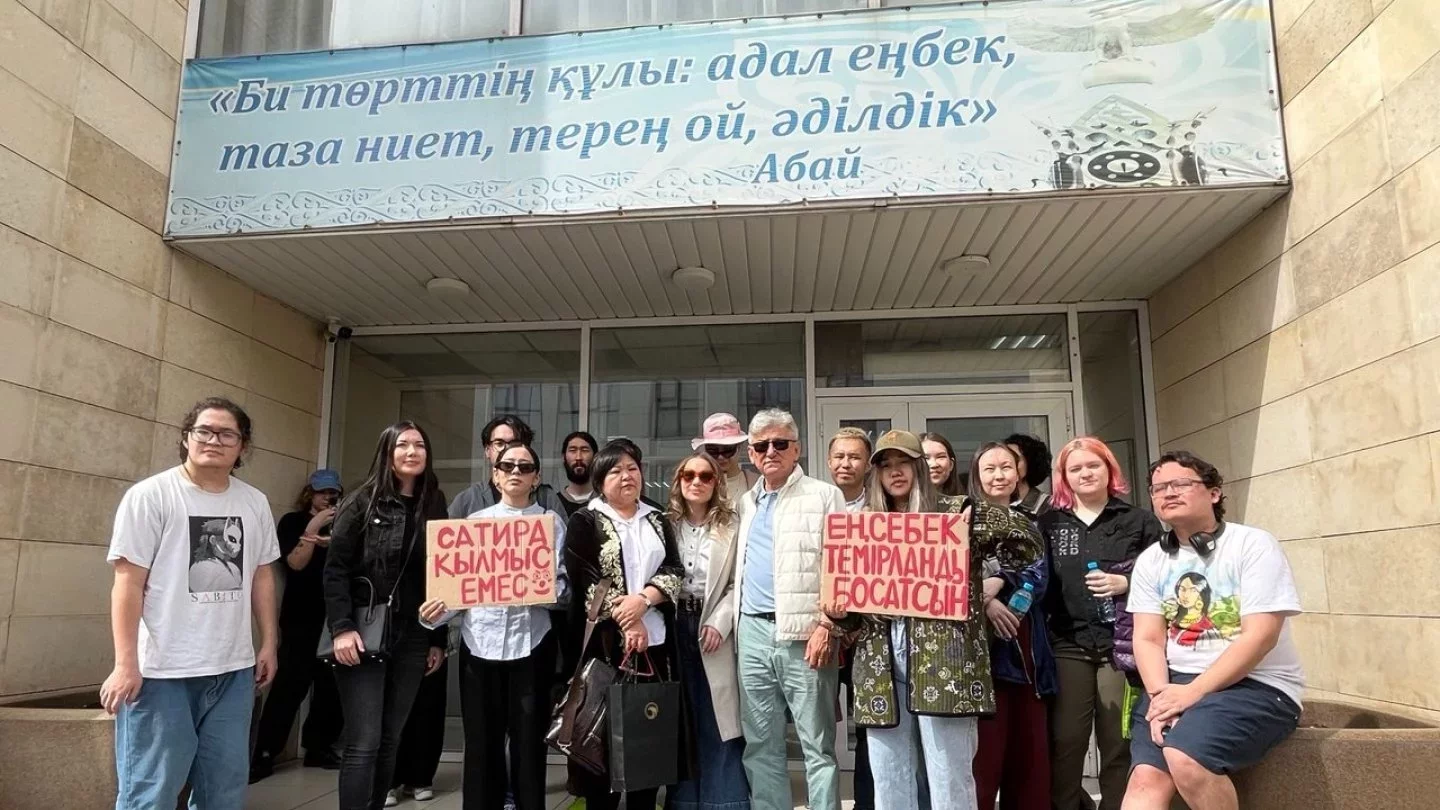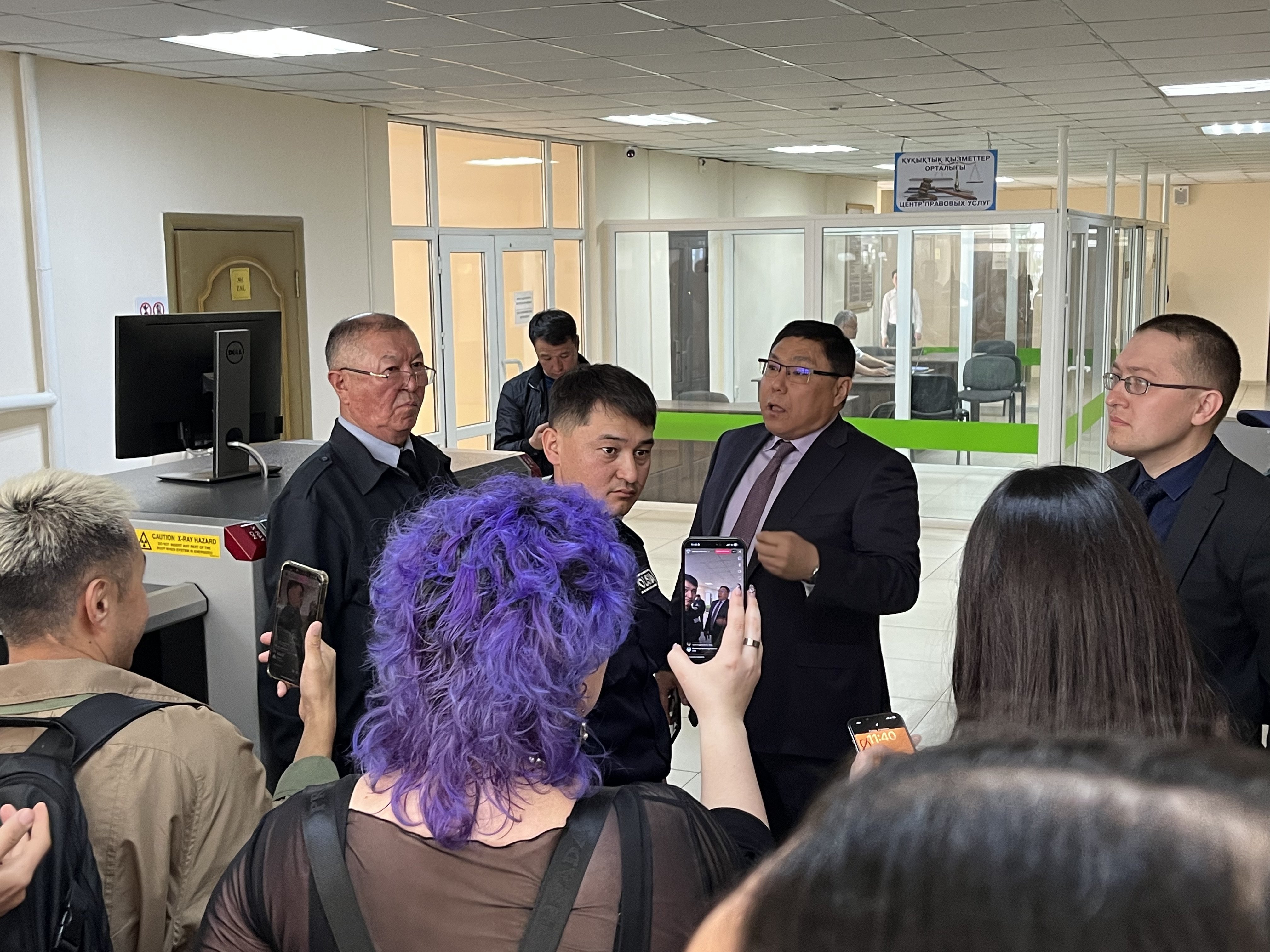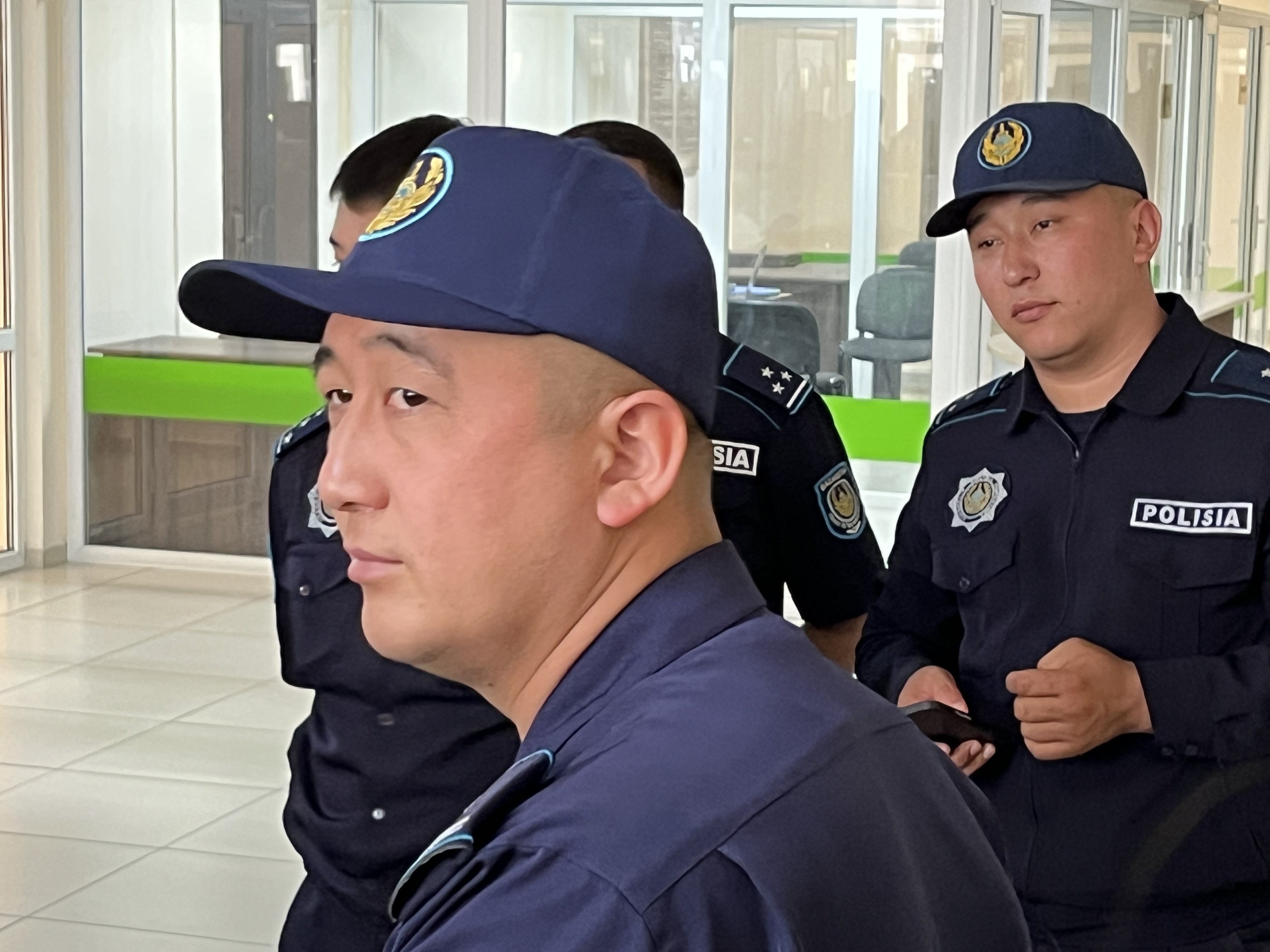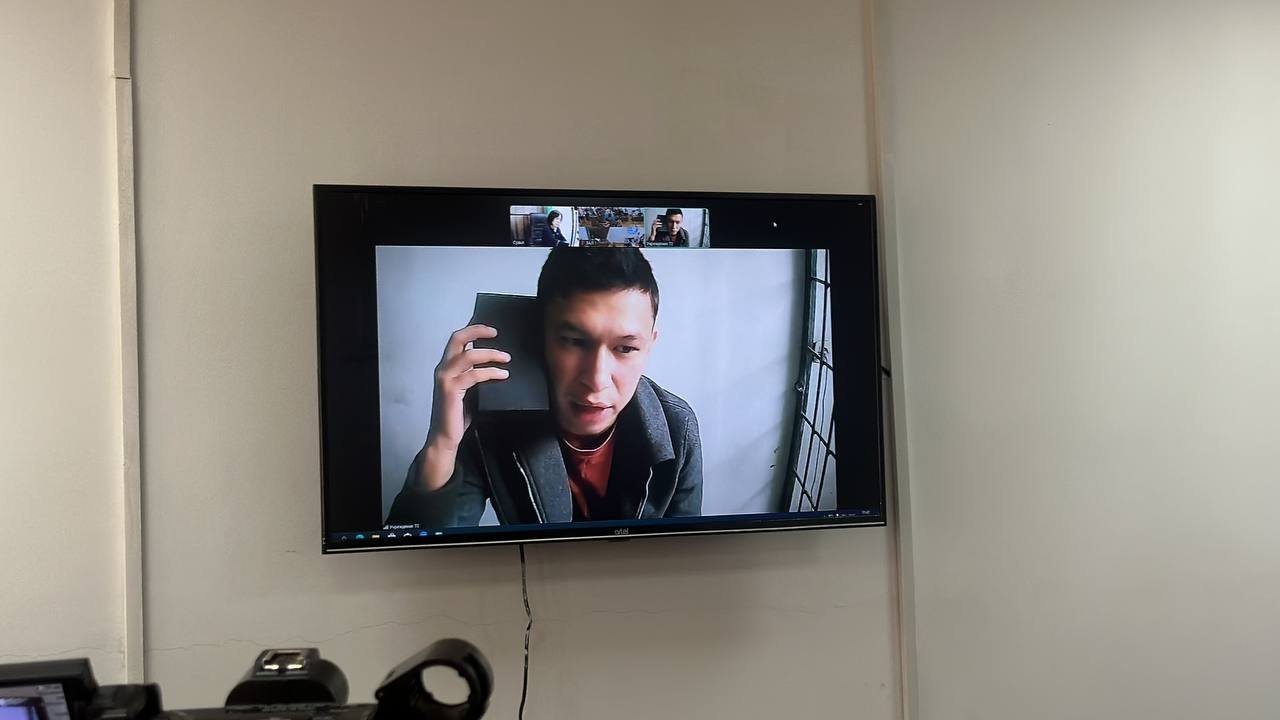An “Open” Trial Behind Closed Doors: How First Day of Temirlan Yensebek's Case Went
 Photo: Orda.kz
Photo: Orda.kz
On April 9 at 11:00 a.m., the Nauryzbay District Court began the so-called “open” trial of Temirlan Yensebek, the creator of the satirical Instagram page Qaznews24, who is facing charges of inciting ethnic discord.
Journalists and observers were denied entry to the courtroom. Police, court officials, and Akimat representatives were called in to calm the growing crowd. Orda.kz correspondents were also denied entrance.
Are You Afraid of Us?
By the time the hearing was set to begin, a group had gathered at the entrance to the court building — Temirlan’s father, his partner, journalists, activists, and human rights defenders. At 11:00 sharp, everyone lined up at the turnstile, waiting to be let in.
Orda.kz reporters had received prior accreditation and were greeted by the court’s press secretary: "Orda.kz, I saw you."
But as names were called, ours was never mentioned, and we weren’t allowed in by queue order either. The explanation was simple: “No more available seats.” Court officials told us to wait but did not indicate how long or whether entry would be allowed.
They claimed other hearings were in progress in neighboring courtrooms. However, even from the entrance, it was clear that the first courtroom on the left was empty. Many pointed out that at the Almaly District Court, where the preliminary hearing was held earlier, journalists were granted access, and observers were seated in a separate room with a livestream.
As the crowd grew tense, chants began to erupt:
“Ashyq sot!” — “Open court!” “Temirlanga bostandyq!” — “Free Temirlan!”
The silence and inaction of security only fueled the frustration of the roughly 40 people gathered outside. Chants and slogans grew louder, while attempts by an Akimat representative and a police major to calm the crowd had no effect.
Are you afraid of us? The whole country will see your faces anyway! We won't let you close this trial,shouted Maria Kochneva, Temirlan's partner, as she confronted court staff.
But the crowd’s protests were ignored, and those allowed inside were left waiting in a stuffy courtroom for two hours. Frustrated by the lack of access and transparency, many attendees submitted formal complaints to the judge, claiming their rights had been violated.


"Is That What Was Decided?"
Despite earlier assurances, Temirlan was not present in the courtroom. Instead, he was once again connected via video link from the pre-trial detention center. The connection was poor — the sound kept cutting out, and Yensebek had to hold a speaker to his ear.
His father, Marat Turgymbay, expressed confusion and frustration:
At first, they said the trial would be held offline, but then they connected him remotely. It was uncomfortable — his speech kept cutting out, and it was hard to hear him. They didn't explain why they decided that way. He’s not a criminal or a repeat offender. Whenever we asked questions, the only answer we got was, ‘That’s what was decided.’

Some journalists, including reporters from BES.media and Azattyq, were allowed inside the courtroom.
However, Judge Beynegul Kaysina prohibited any live streaming of the proceedings. Three unidentified individuals were also present in the room. They were not introduced, and no one knew who they were.
Later, there were attempts to identify them, as many suspected they were monitoring the room to track down anyone secretly streaming the trial. Some even speculated that their presence was intentional, i.e. to take up space and keep other journalists out.
Men with no visible identification entered the courtroom every ten minutes, clearly there to observe and control the situation. One of them approached journalist Daniyar Moldabekov, who responded directly to the judge:
We are not streaming live. But we are posting videos, we have posted them, and we will continue to post them. That is our job.
The court claimed that observers were watching the trial via Zoom in a separate room, but that room was empty. No screen, no sound, no people — just silence.
Meanwhile, outside the building, the voices of protest could be heard clearly even inside the courtroom: "Ashyq sot!" – "Open court!" "Temirlanga bostandyq!" – "Free Temirlan!". Footage of the chants was later posted on the Telegram channel "Til kespek joq."
Quickly
The hearing began with the prosecutor pushing to start Temirlan Yensebek’s questioning immediately, but his lawyer, Zhanara Balgabayeva, objected, saying she hadn’t had a chance to speak with her client. She requested 10 to 15 minutes for a private consultation, but the prosecutor opposed.
After a brief pause, Judge Beynegul Kaysina reluctantly granted 10 minutes.
The following questioning focused on basic but pointed issues: What kind of page does he run? When did the political pressure begin? Why was he accused of spreading false information in 2022, despite the case being closed due to lack of evidence?
Temirlan answered calmly, reaffirming that his work is purely satirical.
The judge later announced a lunch break. Balgabayeva reminded the court she had another trial scheduled for 3:00 p.m., but the judge insisted they would wait and that the hearing would continue without being postponed.
Their behavior makes it seem like they just want to toss away the case like a hot potato. The court is in a great hurry and is trying to hold the hearing as soon as possible, and considers our conversation with the client for 10 minutes as a delay,Balgabayeva said.
She also highlighted the unusually fast pace of the pre-trial investigation, which lasted only 15 days—an unusually short time for such a case. Now, she says, the court is following the same rushed timeline.
Today we were told that all the witnesses and the expert were invited. Honestly, if we had managed to question them all, I wouldn’t be surprised if they announced the verdict tomorrow,she added.
Temirlan’s father, Marat Turgymbay, was forced to speak Russian during the hearing, despite Kazakh being his native language. In Kazakhstan, trials may be held in either Kazakh or Russian, but every citizen has the constitutional right to speak in Kazakh.
Witnesses also have the right to testify in their native language; courts must provide translation when needed.
Maybe the judge will take offense, but why couldn’t the trial be conducted in both languages? There was no need for a translator — almost everyone in the courtroom was Kazakh, including the journalists. The judge, the lawyer, the prosecutor — they were all ethnic Kazakhs. But I was told to speak Russian. Of course, I can speak Russian, but it’s easier for me to express myself in Kazakh. Well, never mind — we’ll adapt. I did my best to get my message across in Russian. I’m an artist, not a man of many words. I expressed my thoughts and wishes briefly,Turgymbay said.
Meanwhile, the next hearing in Temirlan Yensebek’s case is scheduled for April 10 at 15:00 at the Nauryzbay District Court in Almaty. Temirlan continues to demand an open and transparent trial, but remains isolated.
While the court maintains that the proceedings are public, access remains restricted.
Yensebek is facing criminal charges over a satirical post that referenced Tina Kandelaki and the song “Yo, Orystar.”
Original Author: Alina Pak
Latest news
- Kazakhstan Prosecutor Opposes Deportation of 16-Year-Old Russian Teen
- Russian TV Channels Taken Off Air in Kazakhstan
- Mistaken Claim? Kazakhstan Denies $1B Contribution to the Board of Peace
- How many Kazakhstanis remain in the Middle East — MFA
- Kazhydromet Warns of High Flood Risk in Five Regions in 2026
- MP Calls for Prosecutor Review of Kazakhstanis’ Dubai Property
- Kazakhstan Moves to Legalize Private Detective Work
- Kazakhstan to Extend Gas Export Ban for Six More Months
- Majilis MP Calls to Soften Liability for Kazakhstanis Drawn into Foreign Wars for Pay
- The Delivery of 51 Stadler Passenger Coaches Has Been Delayed
- Kazakhstan Returns Nearly 1,000 Citizens From the Middle East
- Damaged Baikonur Launch Pad Facility Restored After 2025 Collapse
- A Rare Black Melanist Wolf Was Shot in Eastern Kazakhstan
- Kazakhstan Maintains Neutral Stance on Middle East Escalation
- Kazakh MFA: Citizens Evacuated from the Middle East via Oman and Saudi Arabia
- Kazakhstan to Spend 4.6 Trillion Tenge on Road Projects Through 2029
- Central Asia Competes for the Skies: Why Kazakhstan Risks Falling Behind Uzbekistan on Jet Fuel
- The War in Iran Opens a Window of Opportunity for Kazakhstan’s Oil Sector, Analysts Say
- Iran Conflict Escalates Beyond the Gulf: What Kazakh Experts Say About Risks for Central Asia and Kazakhstan
- Kazakhstan Prepares Possible Evacuation of Its Citizens From Iran

